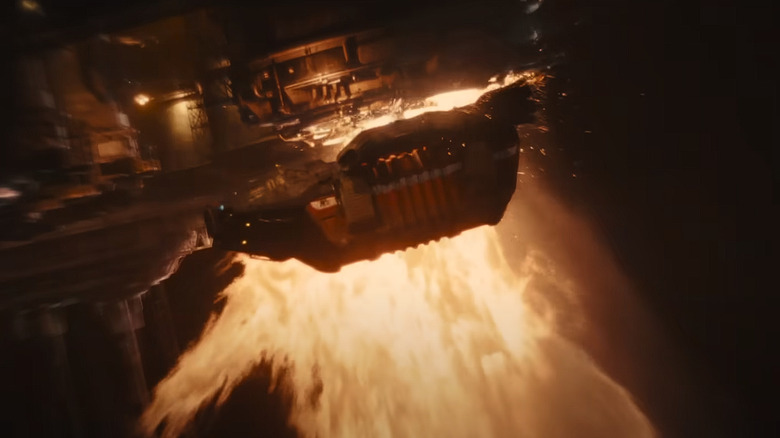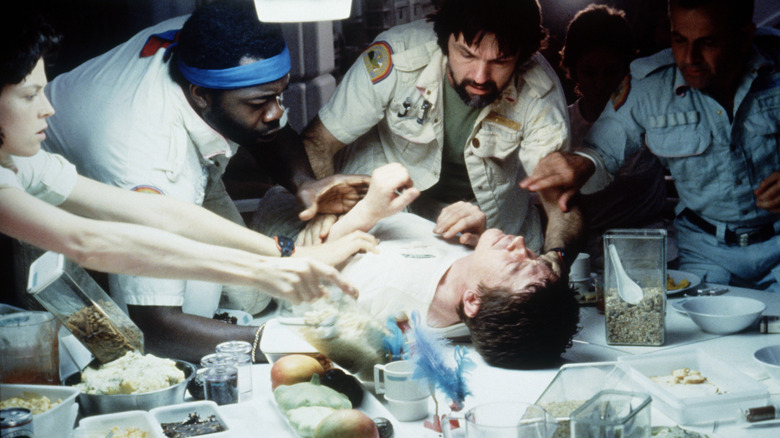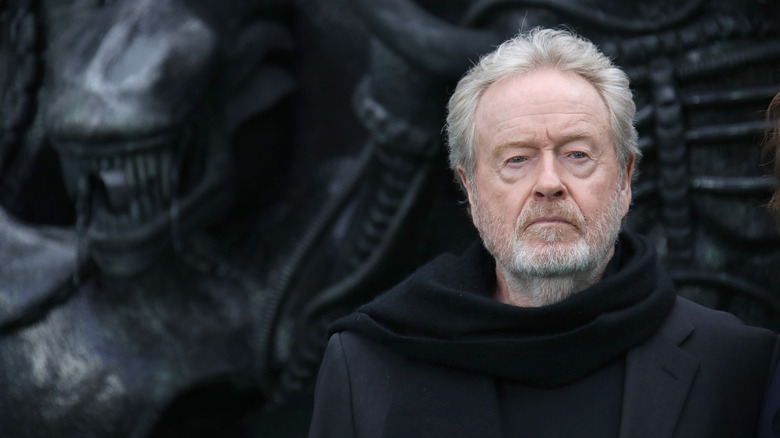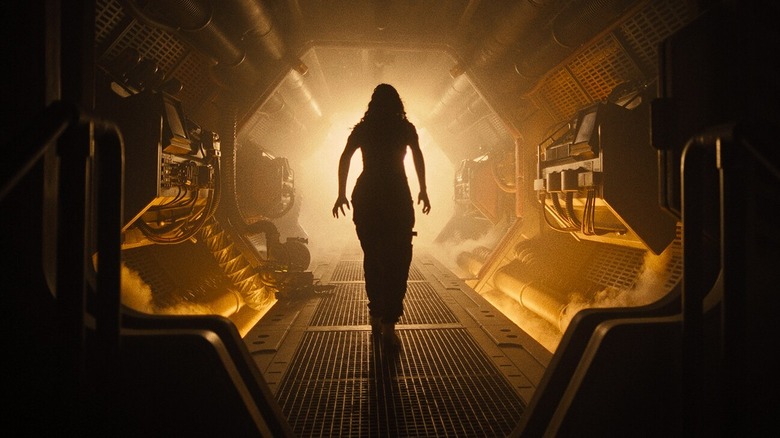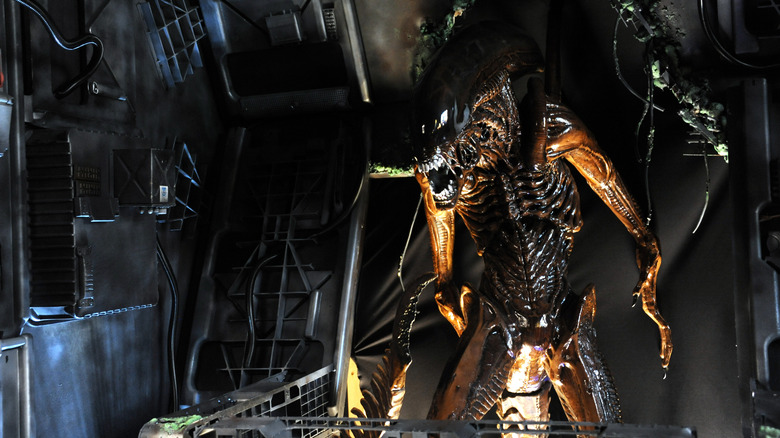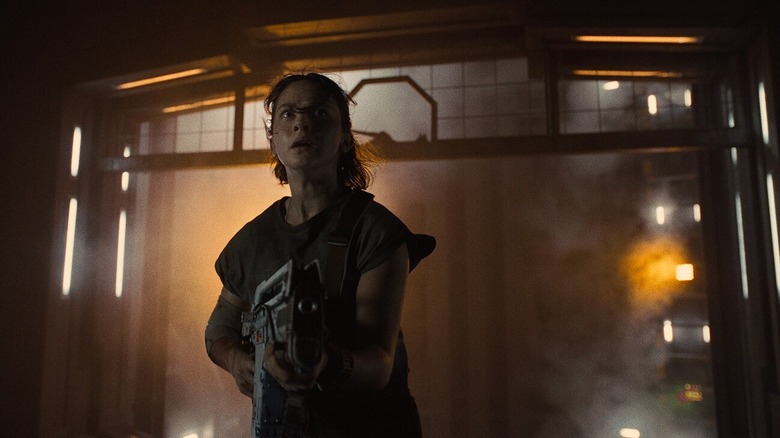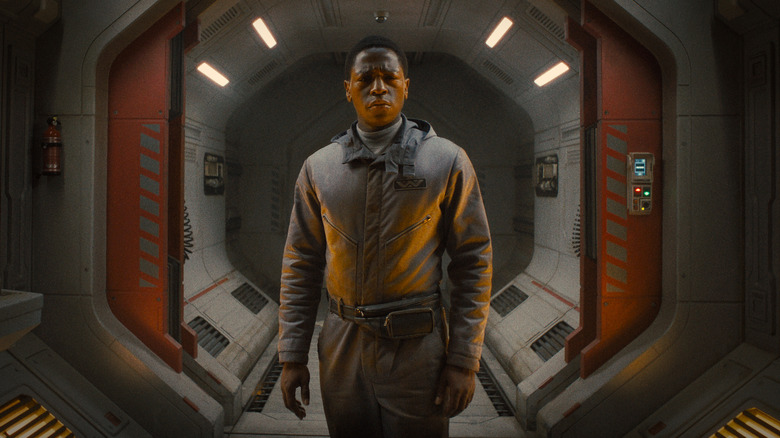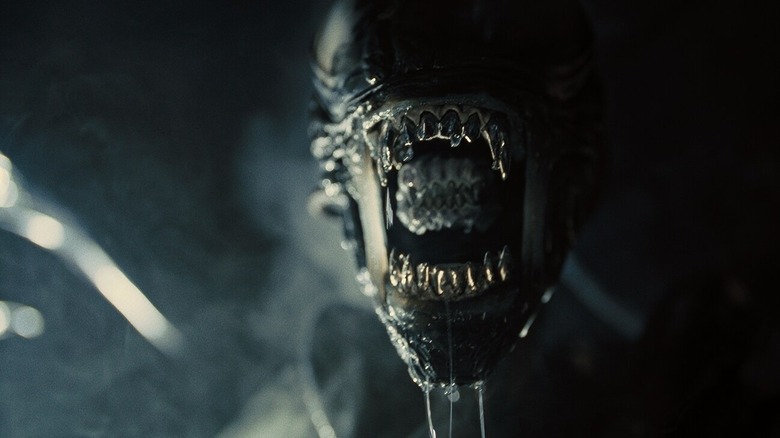Why Alien: Romulus Will Blow You Away
In space, no one can hear you scream — but here on Earth, you can probably hear us shrieking with delight over the fact that the arrival of a brand new "Alien" film is just around the corner.
On August 16, 2024, 20th Century Studios will release "Alien: Romulus," the seventh film (not including the "Alien vs. Predator" duology) in the almost 50-year-old sci-fi series and — seemingly — the beginning of a new era for the franchise as a whole. With a prestige series from "Fargo" and "Legion" creator Noah Hawley on the horizon and Ridley Scott's divisive "Prometheus" prequel films still lurking in the rearview mirror, this new installment carries almost as much baggage as it does pressure to rejuvenate the hype for this bleak cinematic universe.
Reportedly written to take place during an intriguing turning point in the original series, "Romulus" has a unique chance to return "Alien" to its roots of subtle world building, straightforward plotting, and good old-fashioned claustrophobic horror. The xenomorph saga may have seemed like a universe in perpetual decline for some fans, but — if Disney and 20th Century Studios have taken advantage of the opportunities laid out before them, and if certain omens of success are to be trusted — it may yet be revived as a prominent, modern science fiction franchise to rival the likes of "Star Wars" and Denis Villeneuve's "Dune." Let's look at why that could happen.
Alien: Romulus could reset the franchise as a whole
After the bizarre, underwhelmingly reactionary turn of the 1997 film "Alien Resurrection," the franchise completed its gradual and lamentable descent into full-blown mindless sci-fi/horror schlock. In the comic book world, xenomorphs were shoehorned into every bankable intellectual property ranging from Batman, Superman, and Green Lantern to Judge Dredd and Image Comics' WildC.A.T.s — and that was the least destructive of the franchise's cash-grab streak.
Also during this period in the late '90s, original "Alien" director Ridley Scott and "Aliens" writer-director James Cameron were actually developing a serious sequel to "Resurrection," but Cameron abandoned the project when he learned Fox was simultaneously working with Paul W. S. Anderson on an adaptation of another crossover comic — "Alien vs. Predator."
The rest, as they say, is history. As Cameron claims he predicted before "AVP" or its sequel were released (though it's worth noting that he sincerely enjoyed "AVP" and ranked it third among the first five films), "Alien" had effectively lost credibility as a narrative franchise. When Scott returned to execute the prequel concept he had begun developing with Cameron in the '90s, it was something of an event. Finally, "Alien" would be "Alien" again. Unfortunately, for a wide swath of moviegoers, 2012's "Prometheus" and 2017's "Alien: Covenant" were massive disappointments, with "Prometheus" in particular regarded as intermittently interesting, but woefully and perhaps superficially philosophical.
The film returns to a pivotal time in the series
Horror fans were likely a bit surprised in 2023 to get another mainline "Saw" film some 13 years after the last serialized installment was released — and they were certainly surprised when it turned out to be, in many ways, the second-best film in the series and one of the best horror films of the year.
A massive part of its success can be attributed to its setting. Comfortably situated between the original "Saw" and "Saw II," "Saw X" tells a mostly standalone story without the burden of the preceding seven films. You don't need to see "Saw X" to understand the rest of the movies or vice versa, but they complement each other incredibly well. For this reason, it is particularly exciting that "Alien: Romulus" was reportedly written to take place between "Alien" and "Aliens."
The first and most obvious benefit is that this creates the sort of narrative distance from "Alien: Covenent" for the needed reset we mentioned earlier. But more than that, it gives "Romulus" the chance to play the same game "Saw X" did. If audiences want to prepare for "Romulus," it seems they would only need to watch the first two films, both of which are arguably the best the franchise has to offer. At the same time, having already seen all eight films may create a more rewarding viewing experience, meaning "Romulus" could easily cater to old and new franchise fans alike.
A promising new director is at the helm
Along with its chronological departure from more recent entries in the franchise, 20th Century Studios has brought in a brand new writer-director to lead their newest "Alien" endeavor — and it's someone who has quietly been making a case for himself as a defining voice in modern horror.
"Alien: Romulus" is being directed by Fede Álvarez, from a script he penned with his longtime writing partner Rodo Sayagues. The pair made their feature debut a little over a decade ago in a fairly audacious way with 2013's "Evil Dead," a soft-reboot-slash-sequel to Sam Raimi's beloved "The Evil Dead." The resulting film polarized critics when it first premiered, with many criticizing its unexpected but admittedly bold departure from the style and tone Raimi nailed in the original trilogy. In years since, however, it has amassed something of a cult following and even some rare critical reevaluation.
The Daily Beast praised "Evil Dead" at "the rare reboot that gains power through its rebooted nature," while Inverse opined that its strength "is that everything goes exactly as you expect, yet you're still impressed by the excellent execution." Based on these assessments alone, Álvarez and Sayagues seem like the perfect choice to return a lost franchise like "Alien" to its roots.
The director has Ridley Scott and James Cameron's stamp of approval
Ridley Scott and James Cameron are arguably the defining creators within the "Alien" franchise. It will be comforting to know, then, that Fede Álvarez gave both men access to various cuts of his film and incorporated notes from them both.
Cameron specifically provided feedback on the script, and when he finally got to watch the film, Álvarez told The Hollywood Reporter that he "loved it." Scott, on the other hand, was probably the more daunting critic for Álvarez — both because he serves as an executive producer on "Romulus" and because he's notoriously blunt about his opinions on films, especially those based on his own work. Most notably, he has subtly thrown shade at Denis Villeneuve's "Blade Runner 2049" and even expressed regret at not directing the film himself — ironically, he chose "Alien: Covenant" instead.
Álvarez insisted that Scott be shown "Romulus" first and be given an in-person meeting with Álvarez himself to voice whatever concerns he might have. When said meeting finally took place, Álvarez told The Hollywood Reporter that he was stunned by Scott's reaction: "He walks into the room and he did say, 'Fede, what can I say? It's f***ing great.'" Taking the word of Scott and Cameron at face value, these endorsements are a massive deal for the film, and indicate a level of goodwill that arguably would be hard-won coming from two of cinema's most opinionated and irreverent personalities.
Disney felt confident enough to put it in theaters
Disney and 20th Century Studios' Hulu-aimed horror reboots have done incredibly well critically. Dan Trachtenberg's 2022 "Predator" prequel, "Prey," was lauded by critics and audiences alike, while David Bruckner's "Hellraiser" drew a fairly warm reception as well. Then, through a stroke of odd luck, "The First Omen" got a theatrical upgrade after 2023's dual Hollywood strikes left Disney with massive gaps in its theatrical output — though it came in slightly under its modest box office projections, it netted a tidy $53 million haul and earned very positive reviews. Had it not been a late-stage addition to Disney's release calendar, positioned against box-office-behemoth "Godzilla x Kong: The New Empire," it may have fared even better commercially.
Fede Álvarez told The Hollywood Reporter that the studio suddenly decided to fully commit to "Alien: Romulus" as a theatrical release as soon as production started in March 2023. "Right when we started shooting it, the studio was like, 'F*** it, we're going into theaters with this,'" he said. While it may have appeared stronger if Disney made this decision after test screenings of "Romulus," the studio already had access to the script and had an idea of what the film would be — and giving Álvarez an immediate upgrade allowed him to actually make the film with a theatrical release in mind.
A rising Hollywood star was attracted to the project
The original "Alien" helped launch the career of sci-fi queen Signourney Weaver. Now, "Alien: Romulus" could do the exact same thing for a relatively new and exciting talent — Golden Globe nominee Cailee Spaeny.
Last year, Spaeny led Sofia Coppola's buzzy drama "Priscilla," playing the titular ex-wife of music legend Elvis Presley opposite "Euphoria" breakout Jacob Elordi. Spaeny's performance specifically was characterized by reputable critics as captivating, subtle, and star-making. At the 81st Golden Globe awards in 2024, Spaeny was nominated for Best Actress in a Motion Picture — Drama (the award ultimately went to "Killers of the Flower Moon" star Lily Gladstone).
Spaeny followed up "Priscilla" with a more controversial project — Alex Garland's politically-charged box-office smash "Civil War," in which she joined a daunting ensemble that included Kirsten Dunst, Stephen McKinley Henderson, and Nick Offerman. Looper's review of "Civil War" praised Spaeny's work opposite Dunst. Spaeny's talent and clear dedication to the craft explain why her star is quickly rising in Hollywood — hopefully "Romulus" cements her as a bona fide top-billed actor.
The crew that made Aliens a hit is back
Cailee Spaeny — whose first major acting role came in 2018's "Pacific Rim: Uprising" — has a unique appreciation for both the science fiction genre and the meticulously designed monsters that often call it home. "I love watching those old '70s, '80s action sci-fi films," she told Variety. "And I'm such a fan of [the 'Alien' franchise] and Sigourney Weaver. It's legendary to get to be a part of it." Though Ridley Scott and James Cameron's involvement may have potentially helped make her feel more comfortable about revisiting such hallowed cinematic ground, there was another, more technical factor that excited the actor.
According to Spaeny, Disney and 20th Century Studios brought back some of the design team from Cameron's "Aliens" to design the xenomorphs that will appear in "Alien: Romulus." "The same people who built those xenomorphs actually came on and built ours," she revealed to Variety. "So getting to see the original design with the original people who have been working on these films for 45-plus years and has been so much of their life has been really incredible." With these experienced hands guiding the look of the new film's monsters, the xenomorphs in "Romulus" should especially please longtime fans — including Spaeny herself.
Alien: Romulus aims for a fresh take on the series' tropes
A common theme across Fede Álvarez's films is youth. It's no surprise then that Álvarez's window into the "Alien" world was actually a deleted scene from "Aliens," in which a group of young children can be seen running around the space colony.
Already itching to inject some novelty into the franchise's standard formula of "crew-versus-xenomorph," the writer-director was inspired to give "Romulus" a distinctly youthful point of view. "My first instinct ... was to approach it from the angle of characters who are not professionals or scientists; they're not even adults," Alvarez told Entertainment Weekly. "I liked this concept of putting people in the front seat of the story who are closer to what the audience is — not that the audience is young, more that the audience is completely virgin to the realities of space."
It's a fairly brilliant move on Álvarez's part, and not just because it allows him to bring the franchise to a new generation by utilizing rising talent like Cailee Spaeny and Isabela Merced. If done right, this de-aging likely inspired the creative team to come up with unconventional scenarios and plot solutions for a fresher story that — while aesthetically and tonally rooted in the "Alien" world — will feel unlike anything audiences have seen from the franchise yet.
The android subplot will make up for Prometheus' mistakes
If you felt "Prometheus" and "Alien: Covenant" were, to their detriment, more interested in the philosophical quandaries of "Alien" than they were the actual aliens, chances are that you were not a fan of Michael Fassbender's android character David. For these viewers, Scott's meditations on android personhood were better left to a drama like "Blade Runner," whereas "Alien" films necessitated androids that had a more active, often villainous role in the plot (though, to be fair, one could argue that David makes up for what philosophical waxing he does with the amount of horror he facilitates).
Fortunately for David's fans and detractors, Fede Álvarez appears to be aiming for a happy medium in his new film. In "Alien: Romulus," Cailee Spaeny's character's brother, Andy (David Jonsson), is a synthetic, and while the film seemingly won't send him on a murderous streak, the relationship between these siblings will provide a more tangible yet still complex arena for the franchise's android philosophy. "She loves him like her brother, but there are difficulties growing up with a synthetic, and some of the challenges that she faces during the film are related," Spaeny told EW. "It was really fun to explore having a synthetic as a family member and the questions it poses."
That teaser trailer looked incredible
If speculation and analysis aren't enough to convince you of the potential of "Alien: Romulus," you could always go check out the film's impressive first trailer. When it debuted online in March 2024, fans were almost immediately sold on Fede Álvarez's vision for the franchise.
What seemed to draw the most attention in the brief teaser was the terrifying new take on the "facehuggers," the early-stage xenomorph parasites that can be seen flying through the air in one sequence. It should also not be overlooked that Álvarez has an impressive eye for depicting the interstellar scale and majesty of the blue-collar spacecraft of the "Alien" universe. But this epic sci-fi quality still takes a respectful back seat to the trailer's patient, steady unraveling of the horror that awaits this crew.
Given that this trailer is less than a minute long and yet still managed to have viewers squirming at home, we can hardly imagine what kind of terror will be inflicted upon us when "Alien: Romulus" hits theaters on August 16, 2024.

